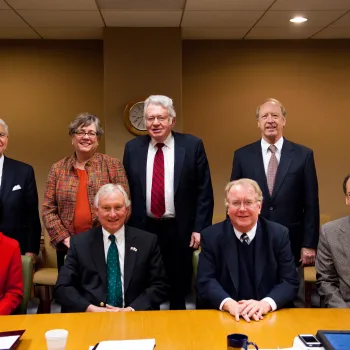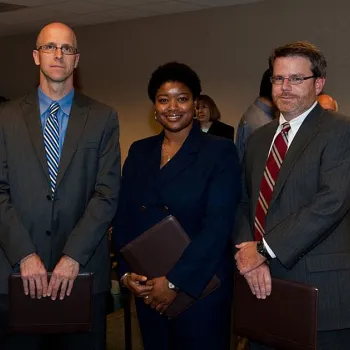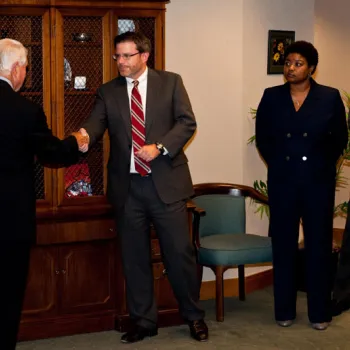The Judiciary can only meet future workload demands if it can continue to attract, develop, and retain highly skilled judges and staff. This goal guided many AO programs and activities in fiscal year 2012.
Committees of the Judicial Conference of the United States
- The Executive Committee
- Committee on Audits and Administrative Office Accountability
- Committee on the Administration of the Bankruptcy System
- Committee on the Budget
- Committee on Codes of Conduct
- Committee on Court Administration and Case Management
- Committee on Criminal Law
- Committee on Defender Services
- Committee on Federal-State Jurisdiction
- Committee on Financial Disclosure
- Committee on Information Technology
- Committee on Intercircuit Assignments
- Committee on International Judicial Relations
- Committee on the Judicial Branch
- Committee on Judicial Conduct and Disability
- Committee on Judicial Resources
- Committee on Judicial Security
- Committee on the Administration of the Magistrate Judges System
- Committee on Rules of Practice and Procedure
- AdvisoryCommittee on Appellate Rules
- Advisory Committee on Bankruptcy Rules
- Advisory Committee on Civil Rules
- Advisory Committee on Criminal Rules
- Advisory Committee on Evidence Rules
- Committee on Space and Facilities
The Judiciary can only meet future workload demands if it can continue to attract, develop, and retain highly skilled judges and staff. This goal guided many AO programs and activities in fiscal year 2012.
Support for the Rule of Law, the Federal Bench, and the Judicial Conference
- Five-Year Committee Self-Evaluation and Jurisdictional Review Conducted: In 2012, each Judicial Conference Committee submitted its recommendation to the Executive Committee, with a justification, whether it should be maintained or abolished—a self-evaluation that is conducted every five years. The Executive Committee made no change to the committee structure itself, but agreed to update outmoded language and make technical revisions in the jurisdictional statements of several committees. Currently, there are 25 Judicial Conference committees, each assisted by AO staff.
-
Pay Issues Affect the Judiciary: Most federal employees, including Judiciary employees, were prohibited from receiving statutory pay adjustments in fiscal year 2012, the second consecutive year adjustments have been denied. In his FY 2013 budget proposal, the President requested an overall 0.5 percent pay adjustment for General Schedule employees beginning in January 2013. However, the continuing appropriations resolution passed in 2012 delayed implementation of any pay adjustment for federal employees until after March 27, 2013.
When Congress passed the “American Taxpayer Relief Act of 2012” (also known as the “fiscal cliff” bill), it included a provision that specifically prohibits Members of Congress from ever receiving their 2013 pay adjustment. While this law blocking the Members’ 2013 pay adjustment does not expressly pertain to the Judiciary, Congress has generally denied judges their annual cost-of-living salary adjustment when Members do not receive one. Congress will still have to affirmatively act to waive “section 140” before judges could receive the 2013 adjustment.
On the next-to-last day of the session, the House also passed a stand-alone bill that eliminated the 2013 adjustment for Members and General Schedule federal employees, but the Senate did not act on this bill before the 112th Congress officially ended. Similar legislation will likely be reintroduced in the new Congress. Thus it is unclear what action Congress ultimately will take, if any, regarding a 2013 ECI adjustment for federal employees.
Inadequate compensation levels are especially affecting the recruitment, retention, and morale of federal judges, whose salaries were last adjusted in January 2009. Efforts to secure reasonable compensation for judges remain severely constrained by national economic conditions and the ever-tightening budget situation. Every legislative initiative that involves spending is constrained by congressional limits on annual appropriation levels and rigidly applied rules mandating cost offsets.
The “Federal Judicial Fairness Act of 2011” was introduced in the Senate with provisions that would authorize judges annual pay adjustments in amounts equivalent to the overall average pay increases authorized for the General Schedule and repeal Section 140 of Pub. L. No. 97-92, which provides that Congress must affirmatively act to give judges an annual salary adjustment. The bill failed to move in the 112th Congress. - Visiting Judges Provide Short-Term Assistance: The intercircuit and intracircuit assignment of Article III judges provide short-term assistance to courts struggling with overwhelming caseloads. For the 12-month period ending September 2012, visiting judges participated in 3,794 appeals closed after oral hearing or submission on briefs. In the district courts, visiting judges closed 1,755 civil cases and cases involving 2,069 criminal defendants. During the same time period, the Judicial Conference Committee on Intercircuit Assignments recommended, and the Chief Justice approved, 215 intercircuit assignments.
-
OSCAR Connects Chambers and Clerkship Applicants: Using OSCAR, the Online System for Clerkship Application and Review, judges and staff attorney offices can find the candidate most suited to their needs, and applicants can find a position that fits their unique interests and talents. In FY 2012, judges’ participation in OSCAR continued to increase, with 1,632 or 70 percent of all federal appellate, district, bankruptcy, and magistrate judges maintaining an OSCAR account. Ninety percent of circuit judges and 78 percent of district judges are OSCAR users. This fiscal year, 1,067 positions were posted to OSCAR, representing a 1.8 percent increase over FY 2011. Law school students submitted the majority of applications, although there were more alumni applicant accounts than student accounts, split respectively, 56 percent and 44 percent.
Eight of the 12 circuit staff attorney offices posted positions on OSCAR in FY 2012, attracting a total of 2,582 online applications. - Judges Benefit from Briefings and Orientation: In fiscal year 2012, 14 new chief judge orientation programs were held for 20 district chief judges and ten orientation programs were held for 52 judicial nominees. These programs provide the judges with an overview and resources for their administrative and non-case related duties. Training on judicial ethics, including financial disclosure reporting requirements, is provided at training programs for newly appointed district and magistrate judges.
-
International Delegations Briefed on Rule of Law: In fiscal year 2012, AO staff briefed 57 foreign delegations from over 70 nations on key aspects of the United States judicial system, including the structure, operation and administration of the federal courts, the Judicial Conference, the courts’ interactions with the media and general public, the rule-making process and the federal judicial appointment process.
In addition, AO staff coordinated four one-day Rule of Law orientation programs in Washington, DC, for 150 judges from Kazakhstan, Moldova, the Russian Federation, Ukraine, and Serbia sponsored by the Open World. Following each program, judges were hosted in courts and communities throughout the United States. - Chambers Staff Participate in Administrative Workshop: The FY 2012 workshop, in which 85 chambers staff participated, covered administrative and operational policies and procedures, including non-case related reports, travel regulations, navigating the J-Net, CM/ECF, court and personal security, ethics, law clerk hiring, and the national court library program. The Workshop also was an opportunity for chambers staff to meet and exchange ideas on how best to provide services to judges and the courts.
- Interim Assessment of Implementation of Strategic Plan Completed: A recent review found that the Conference's committee-based approach to strategic planning is compatible with the Judiciary's governance and policy-making systems. The Executive Committee, which is responsible for the coordination of strategic planning for the Conference and its committees, asked for the interim assessment of the implementation of the Strategic Plan for the Federal Judiciary. The plan, approved by the Conference in September 2010, outlines critical issues, proposes strategies to address them, and identifies high-level goals to accomplish. The interim assessment is based on Conference committees’ feedback about accomplishments and milestones in achieving the plan’s strategies and goals, and the status of ongoing efforts. While significant progress has been achieved on many strategic initiatives, most are ongoing. The assessment also discusses the impact that the budget climate has had on—often delaying or hampering—the accomplishment of strategic goals.
Managing and Retaining the Best Possible Judiciary Workforce
- Educational Programs Expand, Work Processes Improve: Educational programs on benefits and retirement expanded to reach more Judiciary employees, through WebEx and videoconferencing. Employees could also more easily manage their personal and payroll information this year, thanks to upgrades to the online Human Resource Management Information System. Beginning in FY 2012, employees also could better plan for their financial futures with a new Roth Thrift Savings Plan Account and Work/Life Services benefits.
-
Diversity Outreach Strengthened: Now in its second year, the Diversity Recruiting and Outreach Program puts courts in touch with a diverse pool of students, graduates, and other professionals, and highlights the Judiciary as a competitive employer. To date, the program has facilitated court participation at 60 career fairs and legal recruiting events, resulting in direct contact with 6,000 students in 27 districts across all circuits.
The program also builds a strategic network of partnerships with external organizations such as the Just the Beginning Foundation, Congressional Caucuses (Black, Asian, and Hispanic), Council on Legal Education Opportunity, Minority Corporate Counsel Association, National Association for Legal Career Professionals, and the American Bar Association. Of particular note, the partnership between the Committee on Judicial Resources and the Just the Beginning Foundation increased second-year participation to 62 law students for judicial internships with 47 judges. - HR Training Enhanced: In 2012, the AO continued its commitment to provide a comprehensive curriculum of human resources training to meet all experience levels of court HR professionals, from the newly hired HR assistant to the experienced manager. An HR Fundamentals session was held in April 2012 in Washington, DC, to train HR professionals in core human resources and benefit topics, such as position descriptions, pay setting, qualifications, and health and wellness benefits. A full session of the HR Academy was held in August 2012, presenting both HR Fundamentals and HR Leadership, which covered the more complex human resources and employee relations management issues.
-
Director’s Leadership Program Welcomes Fourth Class: The Director’s Leadership Program brings senior and mid-level court and defender organization staff to the AO for a one-year assignment to do substantive work on national initiatives and high-priority projects. The third class (2011 program year), Susan Y. Soong, Cathy A. Tovornik, and Joel Turner, completed their residencies in summer 2012. The fourth class, for the 2012 program year, began their residencies in early fall 2012.
Alec Leddy, Clerk of Court, District of Maine Bankruptcy Court, joins the Office of Court Administration (OCA) on a national project to address the issues and opportunities involved in the implementation of Shared Administrative Services (SAS).
Angela Roberson, Probation Officer Specialist, Northern District of Texas Probation Office, joins the Office of Probation and Pretrial Services (OPPS) to help develop and coordinate training and provide technical assistance to districts implementing risk-based supervision of defendants and offenders.
Todd Steiner, Director of Information Services, Northern District of Indiana District Court, joins the Office of Information Technology and will assist in building requirements, and designing, developing, and implementing a private cloud alternative for the Judiciary. A private cloud could provide virtual machines on demand, cloud storage for Continuity of Operations Plan (COOP), as well as secure platforms for use in software and website design, and development.
Annual Report 2012
- Annual Report 2012
- Fiscal Year Funding and Cost Containment Initiatives
- The Courts and Congress
- Accountability
- Support for Judges and Court Staff
- Overseeing Facilities, Safeguarding the Courts, and Preparing for Emergencies
- Assistance to Courts and Their Programs
- Improving Service to the Public
- Ongoing Pilots and Projects
- Improving Court Case Management, Financial Systems, and Statistical Reporting
- Using Information Technology to Reduce Costs, Increase Efficiencies
- Supporting Defender Services
- Expanding Supervision Capabilities in Probation and Pretrial Services
- Federal Rules of Practice and Procedure
- In Profile: The Administrative Office of the U.S. Courts



